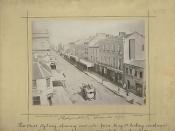When Pitt came to power in December 1783, he came into a huge debt that England had developed over time. This debt hung over Pitt, and the English people, and during his time in office Pitt endeavoured to remove the debt completely. Resourceful new reforms, never tried before, were put into action. They changed the course of the English political system forever. Some historians believe this was not all thanks to Pitt's ingenuity because he didn't actually come up with the reforms himself.
One of the major things Pitt endeavoured to accomplish was ridding English politics of corruption and unnecessary bureaucracy. He accomplished this through a number of ingenious new internal reforms. However it is the opinion of many historians that these reforms were not that ingenious because they were not Pitt's reforms, he merely implemented them. He abolished Sinecures, these were people who were paid to do nothing, they clogged up the system and took away valuable resources; it took Pitt a while but he soon accomplished this, waiting for each of them to die then removing the post.
This was a very useful reform that Pitt took from Edmund Burke; it led to a more efficient government for years to come. Pitt created the "sinking fund" in 1786, which was a much more efficient way of collecting government money that could pay off the national debt. He avoided any corruption by giving only a small amount of people ability to access it. This, Pitt's own invention, only failed because of war and, in only the small time it had, helped tremendously to alleviate National debt. The last, and in some ways least, internal reform he made was to introduce government bids. Pitt realised how much extra the government was spending on little things, such as stationary, so...

![Pitt Street [Sydney] on rainy day, c.1933 / by Sam Hood](https://s.writework.com/uploads/1/15886/pitt-street-sydney-rainy-day-c-1933-sam-hood-thumb.jpg)
